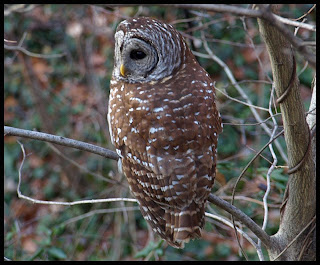Monday, Mar 3rd:

I first saw the Barred owl (Strix varia) in late January when it arrived right outside my office window in the early evening with its characteristic call - "hoo, hoo, too-HOO; hoo, hoo, too-HOO, ooo" which is sometimes translated as - "Who, cooks, for-you? Who, cooks, for-you, all?". I had never seen a Barred owl before and it was an exciting moment for me! Since then, I’ve seen two birds – the first one I saw is a fine specimen (see pictures) with exquisite plumage, and the other, a more dull bird, has a slightly disheveled appearance. I’m uncertain about the gender of each bird, but I’m tempted to assign the more beautiful bird (which also appears a bit larger) as the female. Reverse sexual dimorphism (females larger than males) is common among raptors and is generally the case with Barred owls1,2. The owls seem to start their day (night, for us) rather early and I’ve seen them frequent the area around the pond as early as
Earlier today (~
But, around
Tuesday, Mar 4th:
I was talking to a colleague in my office when suddenly I heard loud calls of the Red-shouldered hawk uttered in a sharp manner and in rapid succession. They sounded harsher than the usual drawn out keeeaah. This time they sounded more abrupt and I immediately suspected something was wrong. The hawk sounded alarmed!
 I rushed to the window and instead of seeing the hawk I saw the Barred owl perched low near the tulip tree. Then I saw some movement nearby and it was the hawk! For a moment, I was confused – what is this trick? Am I seeing an owl or two hawks?
I rushed to the window and instead of seeing the hawk I saw the Barred owl perched low near the tulip tree. Then I saw some movement nearby and it was the hawk! For a moment, I was confused – what is this trick? Am I seeing an owl or two hawks?
Then it occurred to me – The hawk was probably flying over and had spotted the owl as it was starting its day. It was obvious that the hawk did not like what it saw. It was evidently quite agitated with the owl perched within a hundred meters of its new nesting site. Barred owls and Red-shouldered hawks are known to nest within each others territories without apparent conflict1. They are both usually active at very different times of day and that keeps them out of each others way. But, our owls are early risers – sometimes active more than two hours before sunset. This is one of the ideal times for the hawks to be hunting as well. They are very similar sized birds, but the hawk was clearly more aggressive in this situation. Its calls had a determined tone. The message to the owl was clear – you are in my territory and you are not welcome!
The owl retreated to the northern side of the bridge, gave a few low hoots and was gone. The hawk still calling, decided to hang around for a while and hunt from its low perch. Soon, it swooped low and picked up a small rodent then flew towards the pond. From there it again dived low near the fence behind Olin hall and caught another snack, before flying north into the park.
1 Johnsgard, Paul A. (1988) - North American owls: biology and natural history. Smithsonian.

.jpg)
2 comments:
Hi Kaustubh,
Thanks for letting me know about this blog! Your pictures are beautiful, and I love hearing a bit about the goings on at my old "nest." So now there are two beatuiful species to keep an eye on:) Any sign of that crested ibis (sorry that's probably wrong) that had a nest over that road in front of Olin a few years back?
Take care~ Katy
Very interesting blog you have here, I can't wait to see what you cand observe next time, I am really interested about the owls...keep up the good work!
Post a Comment